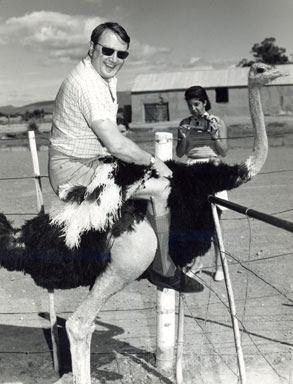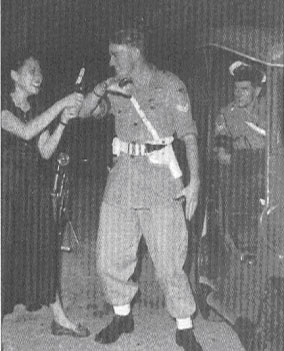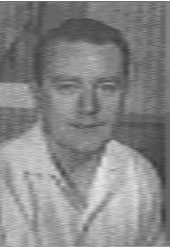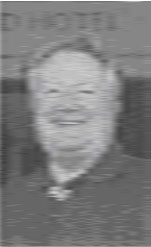Bill Brewer and the land turtle

During his tours of South Africa he has met up with
ostriches and the odd land turtle..

With Daisy in a Singapore Bar 1951
Bill Brewer and the land turtle
|
||
 During his tours of South Africa he has met up with ostriches and the odd land turtle.. |
Anecdotes that Peter can tell are legion, but one that will interest South Africans concern Sunday Times critic Bill Brewer who, on one occasion, acted as Peter's manager. | |
| "It was during my 1964 tour and Bill asked for the job because he was our of work. He joined me in Port Elizabeth,'" Peter recalled. | ||
| "On the way to Windhoek we came across a land turtle. I have never seen anything so big in my life. It was the size of a boulder. We couldn’t get around it because of the terrain – it was rough road in those days. And we just had to sit by the darned thing for two or three hours. | ||
| "I thought it was burping and then I realised that what I was listening to was the desert growing. Deserts are made because rocks split in the heat and they split again and again. I never knew that until I sat there watching the land turtle." | ||
| "In the end it got up and lumbered off. Nobody ever seems to have seen one that I have ever spoken to! | ||
| Bill was with me until we got to Windhoek and then he was invited to join The Sunday Times so he flew back to Johannesburg and I set out to tackle the 3 200km back to civilisation on my own. | ||
| Eventually I picked up a hitch hiker and shared some good cheer (I always had beers and cool drinks in a freezebox in my trunk). | ||
| But I took the wrong turning and we went over to Hopetown over the 'top of Africa' by which time we had drunk all the beer and put all the water into the leaking cars radiator. In the end we had to hold each other up while we tried to personally fill the radiator. | ||
| "By now it was pitch black. The stars were like white twinkling holes. It was a magnificent night. We had been driving for hours and hours. The red light was on and we were running out of petrol” he recalled. | ||
| Later, seeing an African pass on his bicycle, Peter commented: "We must be near civilization”. This caused paroxysm of laughter, hysterical enough to stop the car and eventually in the headlights of the car, in the dusty road, tears rolling down their faces, they realised that an African on a bicycle could well be hundreds of miles from anywhere! | ||
| As it happened Hopetown was just over the hill where they refueled: "I dropped my friend in Bloemfontein. Who he was I never new, but I hope he reads this." | ||
| Passing the time making money ... | ||
| He had joined the RAF in October 1947 (Radio and Radar) and was stationed at Yatesbury. However his father died in November 1948 - just three weeks before his 21st birthday, and he decided to join the RAF Police. The huts were cold. The 'bullshit of polishing floors, having your kit ready, and continuous parades etc., had our 'hero' thinking what a clot he was. | ||
| "Of course I offered to arrange a pantomime to get me off the hard duties, but for the moment, my kind offer was turned down." he recalls. | ||
| "In the next bed was Ginger, by name but not by nature. He was a redhead with whom I found empathy. We discovered that every now and then someone would raffle something. That would that mean that the 'rafflers' had money ... the others did not. | ||
| "Life in the NAFFI or the local picture hall would take on a whole new meaning. | ||
| "Ginger and I found a watch, which worked and which no-one else claimed. So I would raffle it. I would fiddle the raffle so he would win it. | ||
| "Then when the new arrivals had been in camp for about a week, we would raffle it again. | ||
| "Would you believe we raffled that watch no less than six times! Eventually I gave it to him for a good and loyal conniver." | ||
| The Only Bastard who would have Lived | ||
With Daisy in a Singapore Bar 1951 |
In 1951 Peter Maxwell was now in Malaya. He and his group of airmen were told to go up to Frasers Hill and undertake an anti-terrorist exercise. | |
| He recalls: "The bends in the road were always good ambush positions, the enemy was waiting until you were within an 'S' bend situation and then start firing up at you and down at you. | ||
| "We were to take four trucks of chaps up the mountain. The instructors were already in position along the route. They would blow whistles, at which time we were to leap out of the truck and over into the vegetation below the lip of the road." | ||
| The trucks were well up the hill when the whistles blew and Peter was heard shouting 'follow me' and, jumping from the slowing vehicle, he leapt over the side of the road. However he didn't hit vegetation, but a U-shaped concrete half duct covered with water running down from the mountain above. | ||
| In less time than it takes to read this, he had slipped on his back-side over 150 metres and landed feet up in a well and up to his navel in water which continued to cascade further down the mountain: | ||
| "I had lost my firearm and above me was dense, rotting undergrowth of hundreds of years of bamboo and goodness knows what slithery animals!" he said. The voice of the organising officer drifted down: 'where the bloody hells are you, Maxwell?' to which he managed in stout tones: 'I'm down here in the jungle.' | ||
| He was told in no uncertain terms to 'Move your ass up here, we are waiting.' | ||
| "I began the long climb back to the top. Two hours later I scrambled over the edge, bleeding from superficial cuts, grimy, smelly and bloody weary. | ||
| "The rest had been standing by the trucks 'at ease' all this time. I was asked where my firearm was, to which I replied 'down in the bloody jungle' and the lecture which followed made me wish I was a flyer and not in special intelligence. However the end of the tirade was worthwhile. The officer concluded; 'if it had been a real ambush, you would have been the only bastard alive!" | ||
| Life in the '50's | ||
 |
 |
 |
| It was 1956, Peter had just left the Royal Air Force with the rank of sergeant and was running a club called The Debron in Queensway, London. | ||
| The owner was Ted Hardwick, a hard-headed Welshman from the Rhonda Valley, who had befriended Peter when he wanted to arrange shows at the many RAF messes around London. Out of the five clubs Hardwick ran, The Debron was the 'respectable' one and so after the others closed for the night it was there that all sorts would arrive - Jack Spot and Bill Hill, two opposing London gangsters - and many other dubious characters. Peter ran the club, played the piano and opened and shut the doors! |
||
| "There were four call girls" he recounted," all married and living out of London, but with their own flats in town." | ||
"It worked like this: a gentleman member would visit the Club the first week and request that a young lady might be available for lunch next week. I would telephone Maria in Reading and arrange that she would visit The Debron at 11am the following Wednesday. |
||
| "She would come at 11am and he would arrive before midday. I would introduce them if they hadn’t met before, serve them drinks and he would indicate which restaurant they might visit. It was always the Dorchester, the Ritz or somewhere similar. | ||
| "Having made her choice, I would accompany them in a taxi and join them for the first course luncheon. When they were satisfied that an 'arrangement had been made, I would leave them and return to the Club. | ||
| "Maria had her own flat and, after an afternoon of 'leisure', would catch the 4pm train back to Reading to make supper for her husband and two children and, as far as I know, no one ever discovered the truth of the matter." | ||
| In today's promiscuous society, the way boy met girl in the 1950s seems quaint indeed. | ||